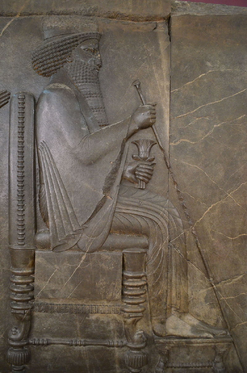Xerxes is a legendary king of Persia. He is the overall main antagonist of 300 film series and the archenemy to the protagonist, King Leonidas. He is the main antagonist of the film, 300, and central antagonist of the sequel, 300: Rise of an Empire. He is based on the real King Xerxes. He wanted to rule the entire world and conquer Greece, especially Sparta.
Biography[]
300[]
He is the main antagonist, who started a war with the Spartans.
The battle begins soon after the Spartans' refusal to lay down their weapons. Using the Hot Gates to their advantage, as well as their superior fighting skills, the Spartans repel wave after wave of the advancing Persian army. Xerxes personally approaches Leonidas and offers him wealth and power in exchange for his submission. Leonidas declines and mocks the inferior quality of Xerxes' fanatical warriors. In response, Xerxes sends in his elite guard, the Immortals; the Spartans nonetheless defeat them with few losses, with slight help from the Arcadians.
On the second day, Xerxes sends in new waves of armies from Asia and other Persian subject states, including war elephants, to crush the Spartans, but to no avail. Meanwhile, an embittered Ephialtes defects to Xerxes to whom he reveals the secret path in exchange for wealth, luxury, women, and a Persian uniform. The Arcadians retreat upon learning of Ephialtes' betrayal, but the Spartans stay.
On the third day, the Persians, led by Ephialtes, traverse the secret path, encircling the Spartans. Xerxes' general again demands their surrender. Leonidas seemingly kneels in submission, allowing Stelios to leap over him and kill the general. Angered, Xerxes orders his troops to attack. Leonidas throws his spear at the god king and cuts Xerxes' cheek, much to his shock. Leonidas and the remaining Spartans fight to the last man until they finally fall to an arrow barrage.
300: Rise of an Empire[]
In 300: Rise of an Empire, more of Xerxes' past is revealed. Ten years ago, prior to the first film, Xerxes is a prince while his father, King Darius, leads the Persians to attack Greece. The Athenians attack first before the Persians could prepare for battle. In this battle, Themistocles kills Darius with a single arrow, causing the Persian forces to retreat back to their kingdom.
With his father's dying breath, he states to Xerxes to give up the campaign, saying, "Only the Gods can defeat the Greeks." For seven days, Xerxes mourned for his father, making him vulnerable for the vengeance-starved Artemisia to plant the seeds of madness within him.
"You shall be... a God King."
After being blessed and wrapped in anointed bandages, Xerxes sets out on a journey through the desert. Xerxes finally reaches a cave and bathes in an otherworldly liquid, emerging as the "God-King", with every bit of his humanity surrendered to give him the form he is now. He returns to Persia and declares war on everyone.
"For God's sake... WAR!"
Xerxes makes various appearances throughout the film. He is seen rallying his troops when Artemisia arrives and tells him of the Greek fleet assembling. Xerxes is undeterred, feeling that his divine power assures him certain victory.
In the aftermath of Thermopylae, Xerxes advances on the corpse of Leonidas and, in a fit of rage, decapitates him. While his army advances through the hot gates of Thermopylae, Xerxes encounters Ephialtes and sends him with a message to the Athenians; that Athens will be next to face his wrath. He is later seen holding Leonidas' severed head while his army burns down Athens.
While Xerxes and Artemisia are in Athens, Xerxes relishes in his apparent victory over Greece, while Artemisia broods over her failure to sway Themistocles to her side. However, Ephialtes approaches them with news of the Athenian fleet in Salamis, and of Themistocles' survival. Both of them are surprised by this. Artemisia intends to destroy him once and for all, but Xerxes objects, feeling that it may be a trap. He advises her that she should not be hasty, and should take the right amount of troops. Artemisia replies that he should not attempt to counsel her in naval warfare, but this angers Xerxes, and he counters that she should not defy him as he is the king. He also reminds her of his victory over the Spartans and the destruction of Athens. When Artemisia points out the flaws in these recent victories, Xerxes angrily strikes her in the face. Despite this, Artemisia insists she shall achieve victory with her entire fleet. Xerxes commands her to stop, but she states that the success of his reign is due to her.
At the Battle of Salamis, Xerxes observes the battle from a cliff. Once Artemisia has fallen and the Spartans arrive, Xerxes turns his back on the battle and retreats to his contingency force waiting on land.
Personality[]

A carving of the historical Xerxes from Persia (Iran).
Xerxes is depicted as energetic, hungry and a megalomaniac. He truly revels in his divine status, believing that he is unassailable. For this reason he is easily angered by any form of defiance. On the surface he appears calm and braggadocious , but underneath he is somewhat insecure. When Artemisia disobeyed his orders and scorned him, he was angry enough to knock her down, but he did not execute her. Rather he seemed shaken by her declaration "Do not forget who put the crown on your childish head!" and did not restrain her. Most of the time he is consumed with his lust for vengeance against the Athenians, due to the part they played in slaying his father Darius. He holds the Greeks in obvious revulsion, yet he declared that he was impressed by the might of the Spartans.
"He is a god."
Although he is bald and clean-shaven in the film, the real Xerxes had "real" hair on his head and as well as a moustache and beard.
Trivia[]
- While the historical Xerxes was best-known in the West as an invader of ancient Greece, after his failed invasion, he also completed his father's unfinished construction projects. He and his son, also named "Darius", were killed by Artabanes, one of his officials and commanders. Darius' brother, Artaxerxes, killed Artabanes and succeeded his murdered father as the next ruler of Persia.
- The brutality of 300's Xerxes was also based on the historical Xerxes' triumphs over several rebellions within the empire.
- The historical Xerxes did not declare himself as a god, but venerated the one god of the Persian religion, Ahura Mazda. To make himself a god would be blasphemy in Zoroastrianism.
- His depiction in 300 as a god-king may have been based on Mesopotamian worship of kings as gods, which was also applied to the Achaemenid kings after their conquest of Babylon.
Gallery[]
| Stub! Help the wiki grow by expanding this article! |



